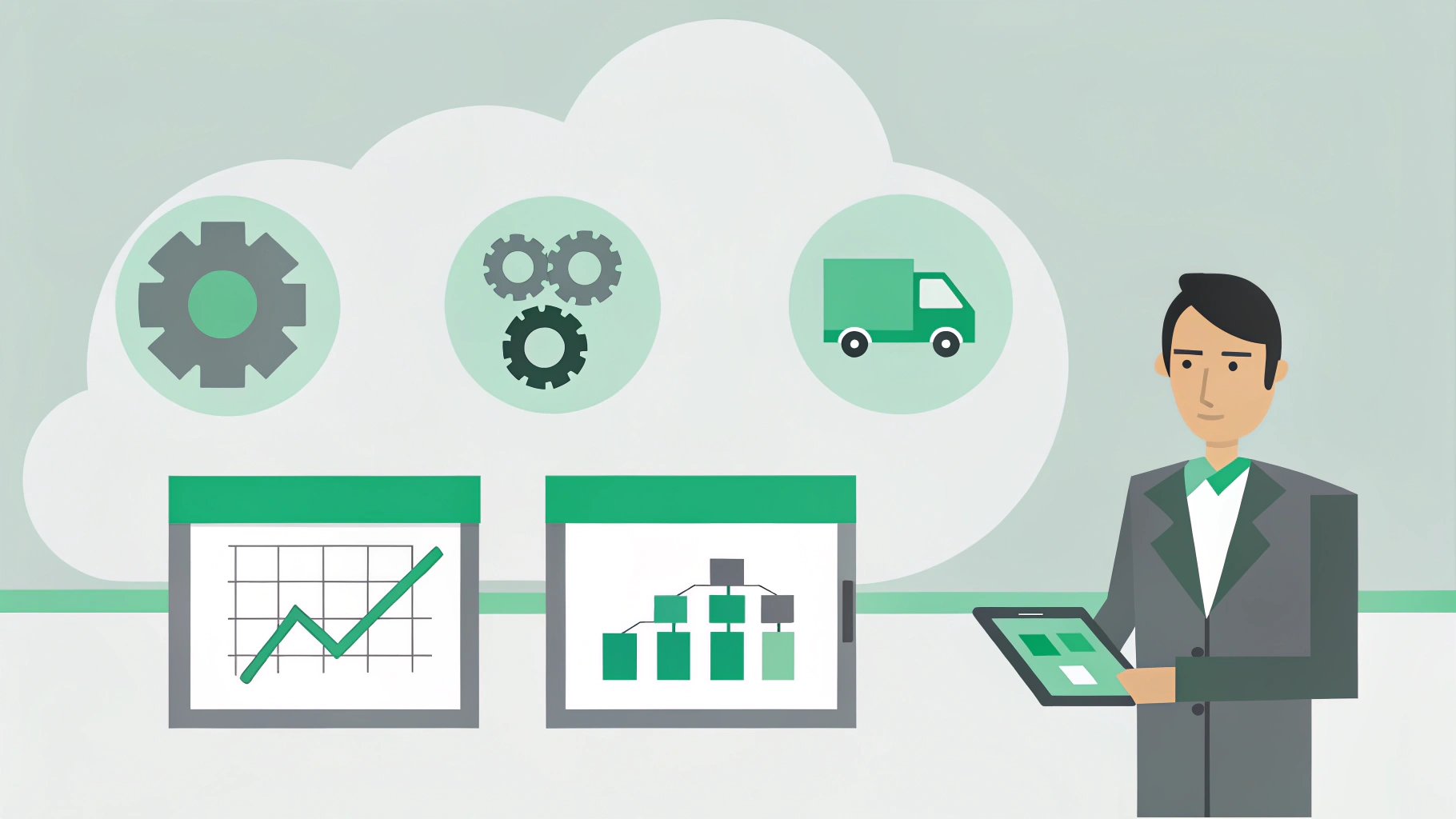Overview
Enterprise Resource Planning (ERP) systems are sophisticated software solutions that integrate various business functions—such as inventory management, order processing, and financial oversight—streamlining operations for distributors. ERPs like 10X ERP significantly enhance operational efficiency and decision-making through real-time data access, seamless integrations, and user-friendly interfaces. This positions distributors for sustained growth in a competitive market.
Consider the implications: with the right ERP system, your organization can unlock unprecedented levels of efficiency. Imagine having instant access to critical data that informs your decisions and optimizes your processes. As the landscape of distribution continues to evolve, the adoption of such technology is not just beneficial; it is essential for maintaining a competitive edge.
The integration of ERPs provides a comprehensive view of business operations, allowing for informed decision-making that drives performance. By leveraging real-time insights, distributors can respond swiftly to market changes, ensuring they remain agile and competitive. The user-friendly nature of these systems further empowers teams, fostering a culture of efficiency and collaboration.
In conclusion, investing in an ERP system like 10X ERP is a strategic move that promises to enhance operational capabilities and drive growth. As you explore solutions to your operational challenges, consider how an ERP can transform your business landscape, ensuring you are not just keeping pace but leading the way in your industry.
Introduction
The landscape of distribution is evolving rapidly. Organizations are increasingly relying on sophisticated software solutions to streamline their operations. Enterprise Resource Planning (ERP) systems, particularly cloud-based options like 10X ERP, provide a comprehensive suite of tools designed to enhance efficiency, improve data access, and foster collaboration across various business functions.
As distributors navigate the complexities of supply chain management, an essential question emerges: What are the critical features and benefits of ERPs that empower them not only to survive but to thrive in a competitive market?
Define ERP: Core Concepts and Functionality
Organizations leverage ERPs as a sophisticated software solution to manage and integrate the critical components of their operations. An ERP system encompasses various functions such as planning, purchasing stock, sales, marketing, finance, and human resources, all within a cohesive framework. The core purpose of ERPs is to streamline processes and information across the organization, facilitating real-time data access and empowering enhanced decision-making.
With 10X ERP, distributors gain a that excels in real-time data processing, ensuring stakeholders have immediate access to crucial information. By centralizing data, 10X ERP effectively eliminates data silos, fosters collaboration, and offers a unified perspective on business operations—an essential advantage for distributors navigating complex supply chains.
Moreover, its seamless integrations and user-friendly interface simplify inventory and accounting management, making it an optimal choice for distribution businesses. By adopting 10X ERPs, organizations not only enhance operational efficiency but also position themselves for sustained growth in a competitive landscape.
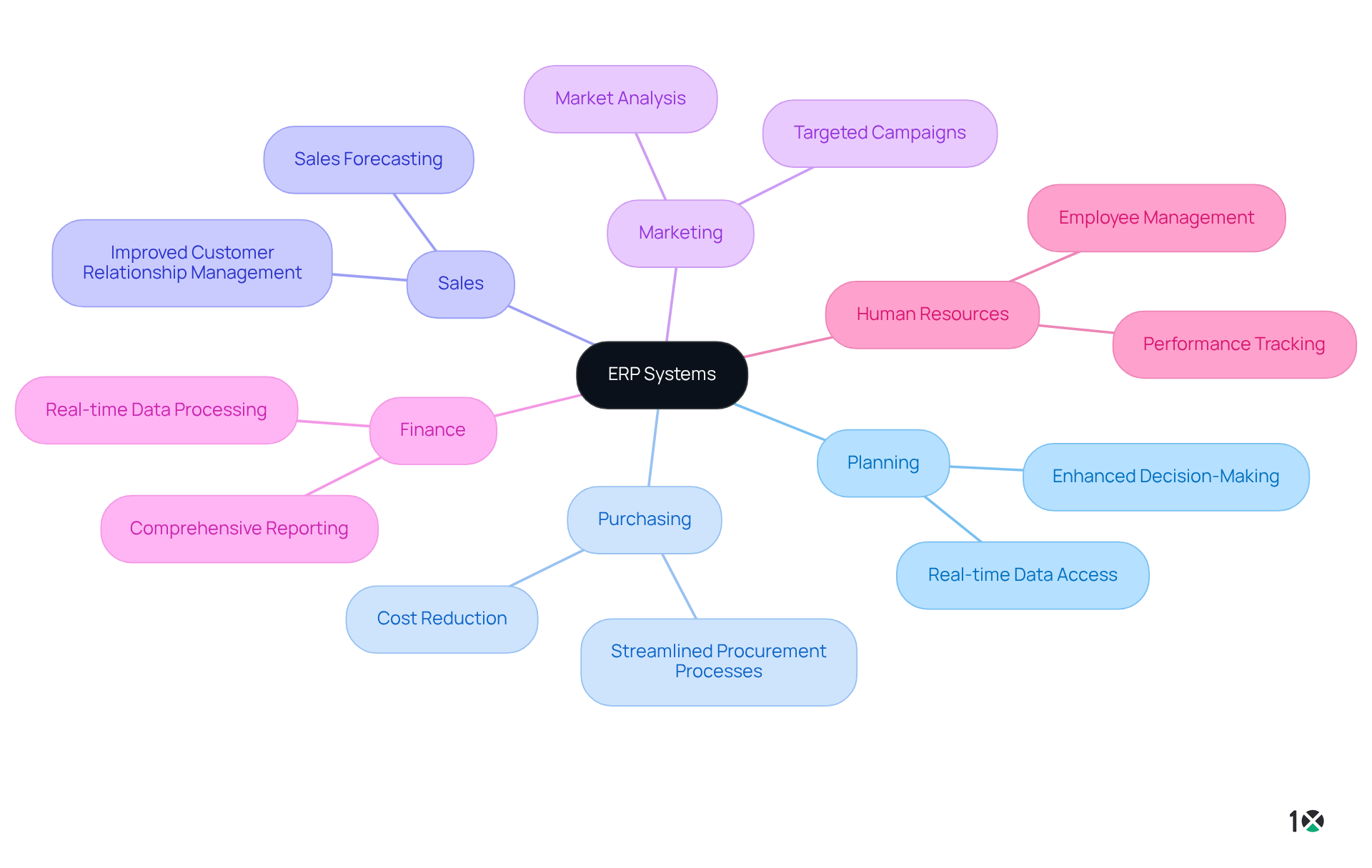
Explore the Evolution of ERP Systems in Distribution
The development of erps solutions began in the 1960s with Material Requirements Planning (MRP), primarily focusing on manufacturing processes. As organizations recognized the necessity for unified solutions, erps emerged in the 1990s, broadening their scope to encompass various business functions beyond manufacturing. In the distribution sector, these frameworks have adapted to tackle specific challenges such as:
Today, erps, particularly like 10X ERP, lead the way by providing real-time data processing and seamless integrations. This contemporary approach empowers distributors to enhance operational efficiency and respond promptly to market demands. Notably, the global erps software market is projected to grow from $50.57 billion in 2021 to $123.41 billion by 2030, reflecting an increasing reliance on these solutions.
Furthermore, 95% of businesses report improvements in their processes following the implementation of erps, highlighting the transformative influence of these technologies within the distribution landscape. This data underscores the critical role erps play in modernizing operations and driving business success.
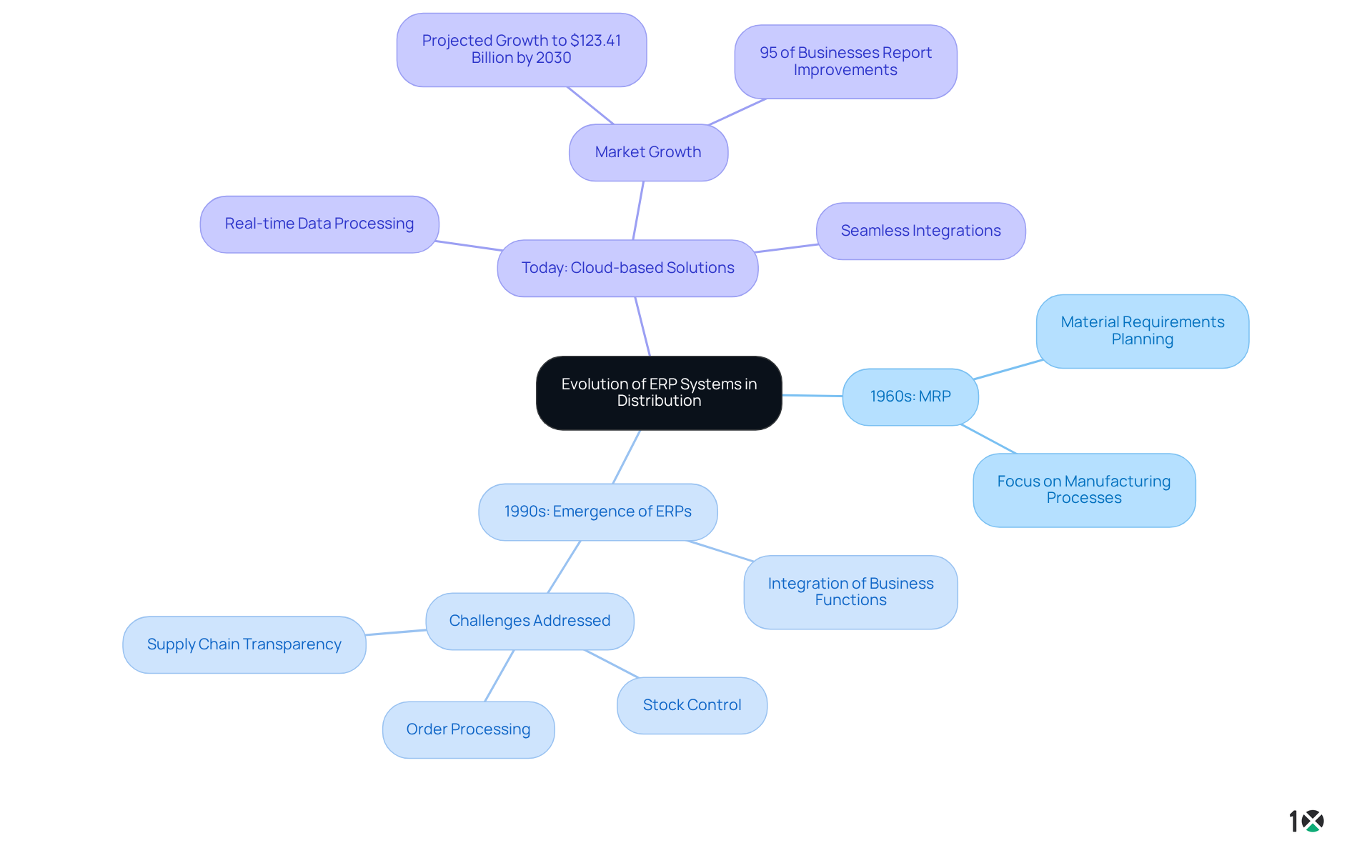
Identify Key Benefits of ERP for Distributors
Adopting ERPs like 10X ERP presents distributors with significant advantages, particularly in stock management, order processing, and supply chain visibility. By centralizing data, ERPs like 10X effectively reduce errors and streamline operations, facilitating informed decision-making grounded in real-time insights.
For example, the advanced applications of 10X ERP allow for precise monitoring of stock levels, which is crucial for maintaining optimal supply and reducing carrying costs. This capability not only mitigates the risk of stockouts but also curtails surplus stock, ultimately leading to decreased holding costs for unsold goods.
Furthermore, ERPs like 10X boost order processing efficiency by automating workflows and offering insights into distribution flow. This empowers distributors to adjust their operations based on real-time information, ensuring that meets customer expectations.
The integration of customer relationship management (CRM) functionalities within 10X ERP enhances customer service by providing a comprehensive view of customer interactions and preferences. As a result, companies can refine their ordering processes according to sales patterns, thereby improving overall stock oversight and contributing to increased customer satisfaction and financial stability.
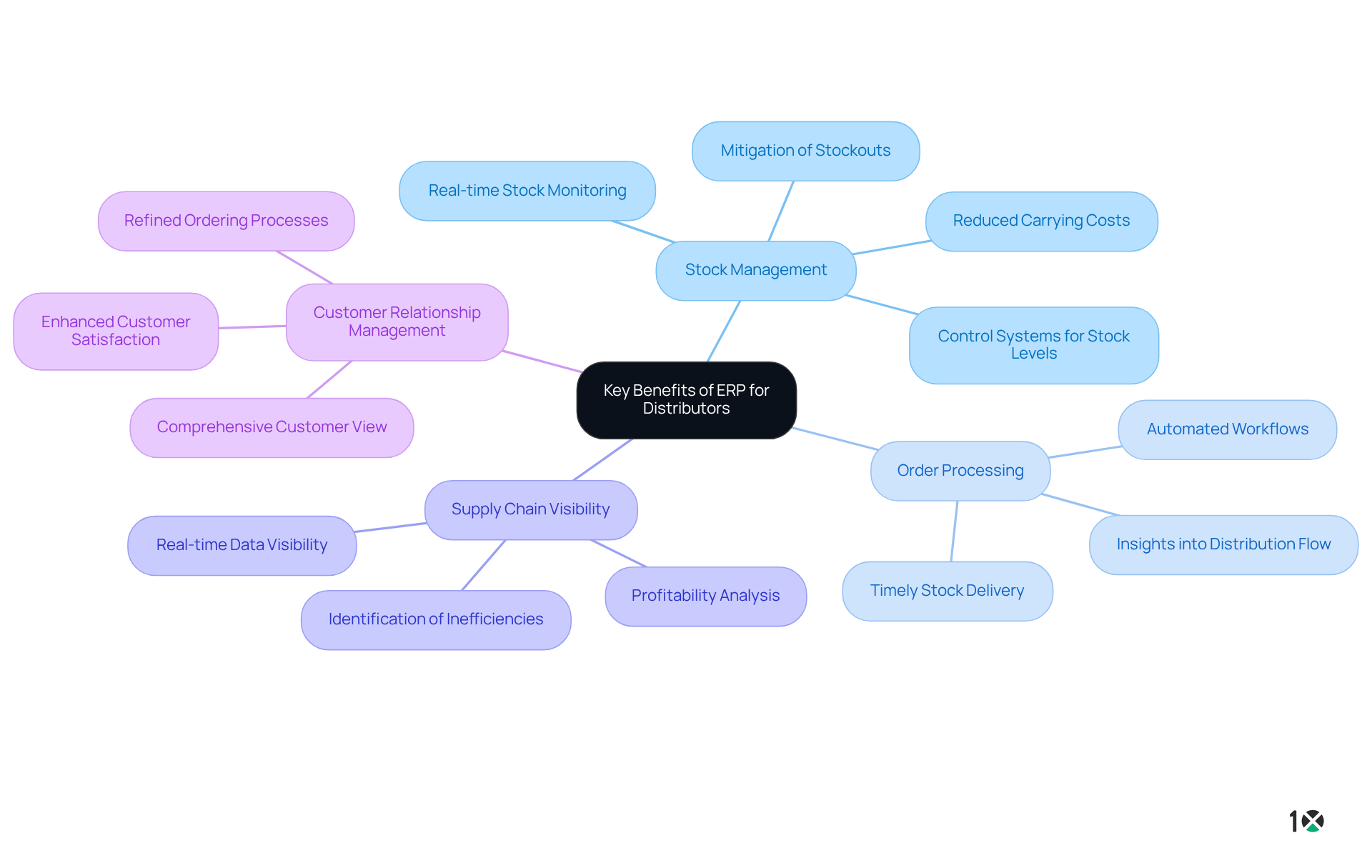
Examine Essential Features of ERP Systems for Distribution
Key attributes of ERPs for distribution encompass strong stock control, optimized order processing, sophisticated demand forecasting, and effective warehouse oversight. Efficient stock management empowers distributors to monitor supply levels in real-time, significantly reducing the likelihood of stockouts and excess supply situations. Companies utilizing ERPs, for instance, report improved stock precision, which is essential for maintaining optimal supply levels and enhancing customer satisfaction through timely deliveries.
Order processing capabilities within ERPs allow for faster fulfillment, reducing lead times and minimizing errors. Automated workflows streamline the entire order lifecycle—from entry to delivery—ensuring that customer demands are met without delay. Demand forecasting tools are pivotal in aiding distributors to anticipate customer needs, allowing proactive adjustments to stock levels. This functionality not only mitigates waste but also , resulting in improved financial performance.
Furthermore, warehouse management functionalities boost operational efficiency by refining storage and retrieval processes. These features guarantee that inventory is organized effectively, facilitating quicker access and diminishing handling times. Additional critical features include:
- Seamless integration with third-party applications
- Comprehensive reporting and analytics tools
- User-friendly interfaces that support rapid onboarding and ease of use
Collectively, these elements empower distributors to elevate their operational capabilities and drive business growth.
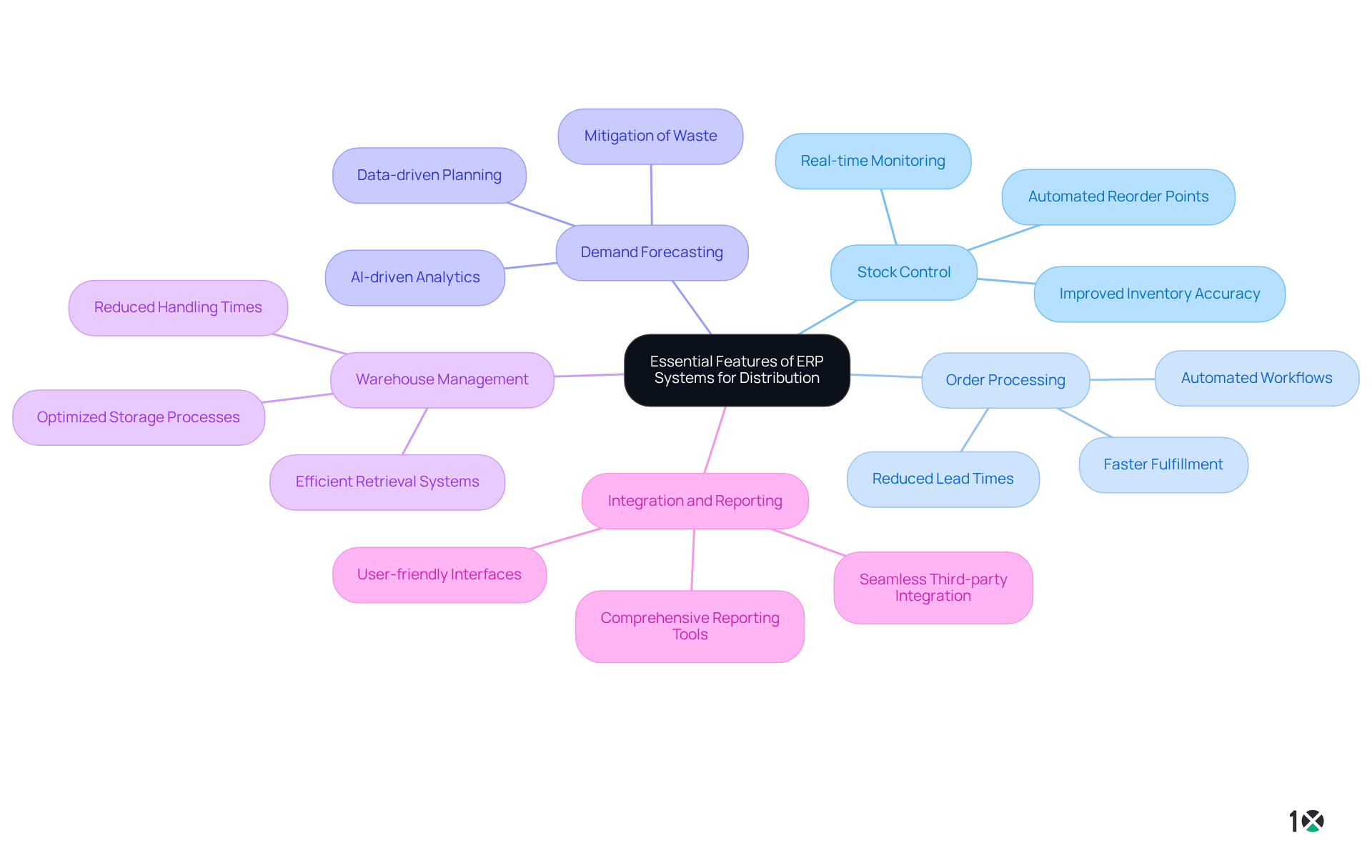
Conclusion
The implementation of ERP systems, particularly cloud-based solutions like 10X ERP, signifies a transformative shift for distributors aiming to enhance operational efficiency and adaptability. By integrating various business functions into a single platform, ERPs streamline processes, foster collaboration, and provide real-time data access. This ultimately empowers organizations to make informed decisions and respond swiftly to market demands.
This article explores the evolution of ERP systems, illustrating their journey from basic material requirements planning to comprehensive solutions that tackle the complex challenges faced by distributors today. Key benefits include improved stock management, efficient order processing, and enhanced supply chain visibility—factors that contribute to better customer satisfaction and reduced operational costs. Furthermore, essential features of modern ERP systems, such as demand forecasting, automated workflows, and user-friendly interfaces, are crucial for driving growth and maintaining competitiveness in the distribution sector.
In a landscape where the ERP software market is poised for significant growth, adopting these systems is not merely an option but a necessity for distributors aiming for long-term success. Embracing ERP technology can lead to substantial improvements in efficiency and profitability. Therefore, it is imperative for businesses to evaluate their current operations and consider integrating robust ERP solutions to thrive in an increasingly competitive environment.
Frequently Asked Questions
What is ERP and what are its core functions?
ERP stands for Enterprise Resource Planning. It is a sophisticated software solution that helps organizations manage and integrate critical components of their operations, including planning, purchasing stock, sales, marketing, finance, and human resources.
What is the primary purpose of an ERP system?
The primary purpose of an ERP system is to streamline processes and information across the organization, facilitating real-time data access and empowering enhanced decision-making.
How does 10X ERP benefit distributors?
10X ERP offers a cloud-based solution that excels in real-time data processing, providing stakeholders with immediate access to crucial information, which helps eliminate data silos and fosters collaboration.
What advantages does 10X ERP provide in terms of data management?
10X ERP centralizes data, offering a unified perspective on business operations, which is essential for distributors managing complex supply chains.
How does 10X ERP simplify inventory and accounting management?
10X ERP features seamless integrations and a user-friendly interface that simplify the management of inventory and accounting tasks for distribution businesses.
What impact does adopting 10X ERP have on organizations?
By adopting 10X ERP, organizations enhance operational efficiency and position themselves for sustained growth in a competitive landscape.
